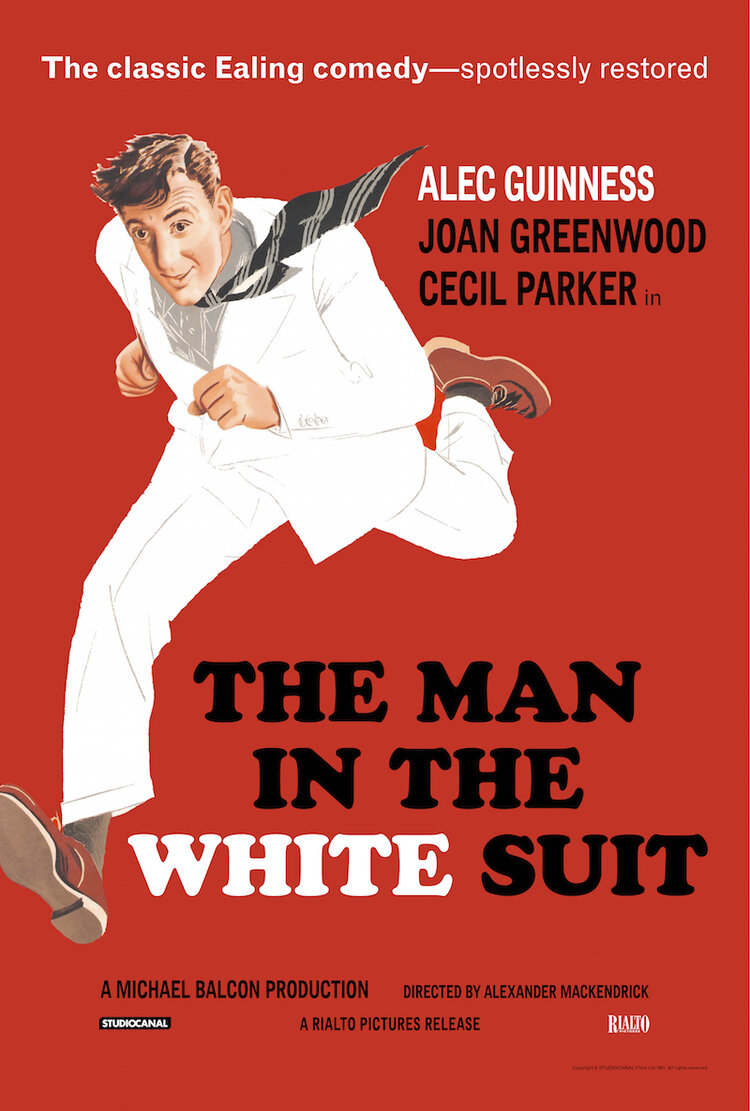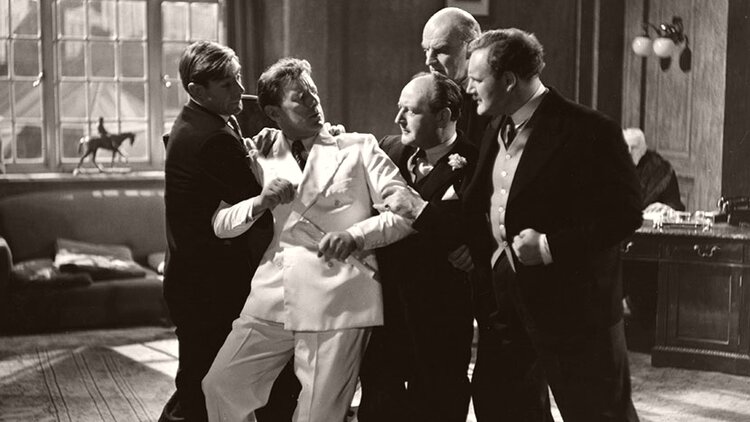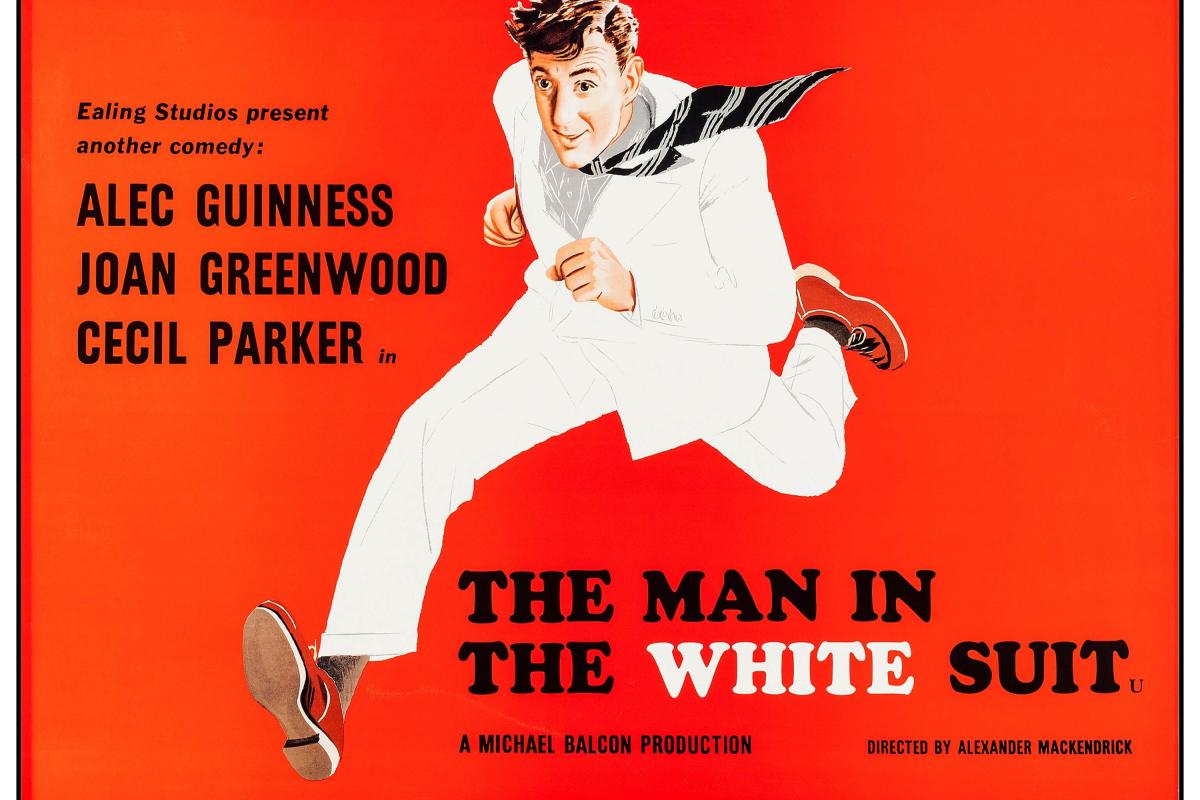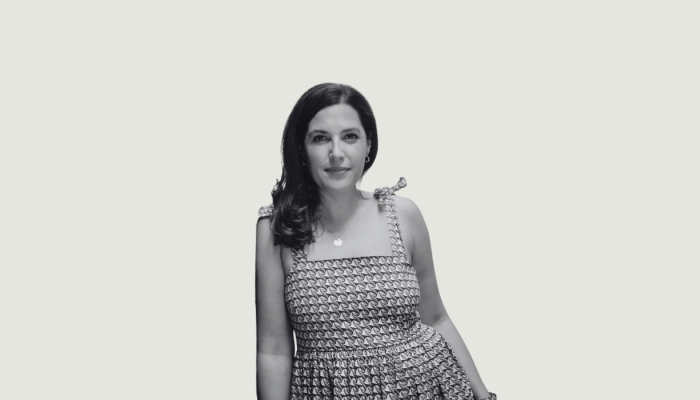‘You’re not even born yet. What do you think happened to all the other things?
The razor blade that never gets blunt, the car that runs on water with just a pinch of something. No, they’ll never let your stuff on the market in a million years.’
Member of the Works Committee to Sidney Stratton, 'The Man In The White Suit'
'The Man In The White Suit' is a fine 1951 Ealing comedy directed by Alexander Mackendrick. Whilst gently satirising the English class system, the film also asks some profound questions about the impact of technology and innovation on labour and capital.
‘Flotsam floating on the flood tide of profits. There's capitalism for you.’
'The Man In The White Suit' is set in the world of northern textile manufacture. Alec Guinness plays Sidney Stratton, a brilliant young research chemist who has been dismissed from jobs at several mills.

‘One day there’ll be someone with real vision… It’s small minds like yours that stand in the way of progress.’
Stratton finds a role in the laboratory of Birnley Mill. Here he constructs a complex apparatus of clamp stands and spiral condensers; a tangle of flasks and funnels, beakers and burettes, that periodically emits beeps and steam. Inspired by new fabrics like rayon and nylon, he sets about designing long chain molecules that form into an incredibly strong, dirt-resistant fibre.
‘He’s made a new kind of cloth. It never gets dirty and it lasts for ever!'
To demonstrate Stratton’s new discovery he has a suit made from the new material. Since it cannot absorb dye and contains radioactive elements, the garment is brilliant white and luminous. He may look a little eccentric in his new threads, but the fabric passes every test. He is congratulated by the owner of Birnley Mill who sees the potential for huge profits, and by the owner's daughter who imagines huge social good.
‘Don’t you understand what this means? Millions of people all over the world living lives of drudgery, fighting an endless losing battle against shabbiness and dirt. You’ve won that battle for them. You’ve set them free. The whole world’s going to bless you.’
However, the broader community of mill owners realises that this new cloth could ruin the textile industry.
‘Are you mad? It’ll knock the bottom out of everything right down to the primary producers. What about the sheep farmers, the cotton growers, the importers and the middle men? It’ll ruin all of them.’
‘Let’s stick to the point. What about us?’
The bosses endeavour to keep Stratton’s invention a secret, and to buy the formula in order to suppress it.
‘There’s only one thing that’ll pull the market together. That is denial backed with suppression. Total and permanent.’
At the same time the local trade unionists realise that the invention could deprive them of their jobs. They take matters into their own hands and lock Stratton up.
‘If this stuff never wears out, we’ll only have one lot to make.’
At length management and workers recognise that they are united in their desire to see Stratton’s innovation checked.
‘What are we arguing for? Nobody wants to market it. My dear friends, you must see that our bone of contention is non-existent. Capital and labour are hand-in-hand in this. Once again, as so often in the past, each needs the help of the other.’

The Man in the White Suit 1951
'The Man In The White Suit' explores themes that are very much relevant today: Should science pursue innovation that improves people’s lives regardless of the impact it may have on industry and employment? How do we deal with the concentration of capital that results from such disruptive change? How do we accommodate the workers who have lost their jobs?
What will we do when we’ve nothing to make?
Some have argued that this industrial revolution, like every previous one, will ultimately create employment in new sectors and businesses. Some see opportunities in areas where emotional intelligence trumps artificial intelligence - in the caring and creative professions for instance. Some have put the case for global tax regimes and Universal Basic Income.
Or will our most pressing problem, as Keynes predicted in 1931, be finding how to fill our newly abundant leisure time?
'For the first time since his creation man will be faced with his real, his permanent problem—how to use his freedom from pressing economic cares, how to occupy the leisure, which science and compound interest will have won.’
John Meynard Keynes, 'Economic Possibilities'
We all want to be on the side of progress. None of us longs to be a Luddite. But it would help if we could agree on some credible answers to these fundamental questions.
When Stratton escapes capture, he is chased by an angry mob through the streets of the town. He encounters his elderly washerwoman.
‘Why can't you scientists leave things alone? What about my bit of washing when there's no washing to do?’
At this point we become aware that there is a fault in the invention: after a period of time the fabric deteriorates. When the bosses and workers finally corner an exhausted Stratton, they see that the white suit is beginning to fall apart. Delighted, they rip what remains of it to pieces. The misunderstood inventor is left standing in his underwear.
'They paved paradise
And put up a parking lot.
With a pink hotel, a boutique
And a swinging hot spot.
Don't it always seem to go
That you don't know what you've got
'Till it's gone.
They paved paradise
And put up a parking lot.
Joni Mitchell, ‘Big Yellow Taxi'
This first appeared on Jim's blog here.



